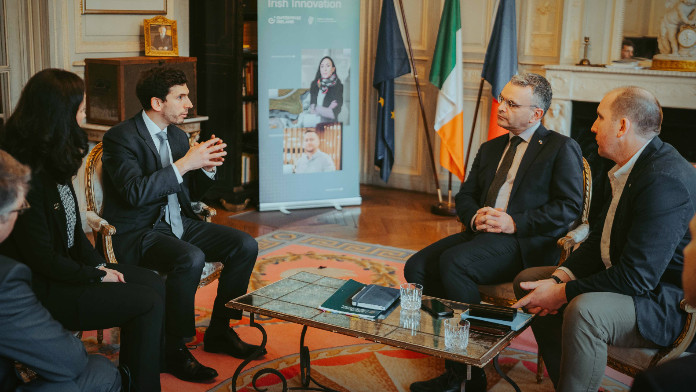Core network specialist Druid Software has announced a deal with French neutral host operator and system integrator TDF to jointly provide private 5G systems to critical industry in France. The announcement is part of a charm offensive by the Irish firm both home and abroad. It has confirmed it is working with RAN software developer Node-H in Germany to develop a 5G NR solution for enterprise usage in the local n78 (3500 MHz) band, and has also joined the European Users Wireless Enterprise Network Association (EUWENA) to meet with an the Irish government to push industrial 5G usage.
The new go-to-market deal with TDF in France attends the country’s move to liberate spectrum for enterprise-owned private 5G projects. By last October, French regulator Arcep had awarded three trial spectrum licences for enterprises to deploy private 5G networks in the 3.8-4.0 GHz band, taking its total roster of enterprise trialists in France to 13; by December, the total was 25. TDF, already hosting critical telecoms infrastructure in France, is to add private 5G installation and management to its Industry 4.0 services mix; Druid Software’s Raemis system will be an option for the core networking component.
A statement said it is in position to offer “the best end-to-end solution of private 5G network” to France-based enterprises and organisations, including a “state-of-the-art network operations centre (NOC)” for centralised management of to operate business-critical 5G systems. TDF claims 19,000 sites to host antennas, a proprietary fiber network to backhaul remote sites, and industrial expertise to design, build, and run 5G networks, according to a press statement. TDF selected Druid Software after an extensive evaluation process, apparently. The two companies met in Paris a couple of weeks back with and the Irish minister for trade and digital regulation, Dara Calleary, and the Irish Ambassador to France, Niall Burgess.
About the same time, Druid Software also joined EUWENA to meet with Calleary and Burgess in Paris. Their joint agenda at the meeting, and ongoing, was to push for further liberalisation and harmonisation of telecoms spectrum and faster adoption of private cellular, both at home in Ireland, and abroad via trade relationships in Europe. EUWENA’s role, as well, is to “inform, advise and represent” European enterprises on private 5G spectrum, regulation, and best practices. Druid Software was in France as part of a delegation organised by Enterprise Ireland to connect French and Irish companies.
Meanwhile, Druid Software’s arrangement with Node-H in Germany is geared for industrial 5G networks. Node-H’s software is used in low-cost 5G small cells running in the n78 band. A statement said their collaboration “helps to address the 5G SA use cases in Germany’s [state]-sponsored CampusOS project”. The CampusOS project seeks to address the needs of so-called ‘campus networks’ in manufacturing and factory automation use cases. The pair are working to integrate their radio and core network components – as combined in private 5G deployments already by “multiple” system integrators in Germany and Europe as the basis of 5G SA offerings in public and private networks.
A statement explained: “Node-H’s 5G SA RAN software builds on years of experience deploying 3G and 4G enterprise RAN products in the networks of senior mobile operators. The cells are based on the lowest cost system-on-chip (SoC) solutions, built by skilled manufacturers who specialize in high volume manufacturing at low cost. The standard all-in-one approach makes for simple deployment, based on the open RAN management approach, and still allows a disaggregated O-RAN split 2 configured deployment.”
Of the TDF partnership, Tadhg Kenny, president of global partnerships at Druid Software, said: “TDF plays a very important role for us in bringing together their clients in-depth operational expertise, a mix of unique and ground-breaking technology and an exceptionally widespread local presence.”
Sébastien Semaan, deputy head of private networks at TDF, said: “As an integrator it is our daily business to solve problems for our customers, providing the latest solutions, vendor technologies and software platforms. Druid’s reliable 5G Raemis core solution is a key component in our 5G private networks solution and we highly value Druid’s experience in this market segment.”
Of the Node-H arrangement, Liam Kenny, chief executive at Druid Software, commented: “[This] collaboration… helps facilitate [Germany’s] CampusOS project in its aim to compile a list of 5G campus network building blocks. One project for a major German manufacturing brand we can’t disclose yet, will be using our Raemis platforms slicing capabilities to prioritize some of their manufacturing use cases.”
Mike Cronin, chief executive at Node-H, added: “Our involvement in the CampusOS project has given us a deeper insight into what matters to support the use cases in a range of market verticals, but with the emphasis on manufacturing. For example, our 5G SA cells can be configured to maximize uplink bandwidth allowing AGVs to send camera streams to AI-based servers to lower cost and improve operational security in the factory.”

